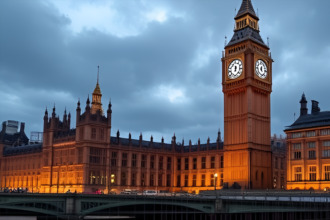What Are the Unfair Advantages for Rivals in the Fast Fashion Market?
Julian Dunkerton, the head of the clothes chain Superdry, has openly criticized the fast fashion behemoth Shein for being let to “dodge tax” and is calling on the UK government to act decisively. Dunkerton voiced worries about Shein’s unfair advantage from import duty exemptions on low-value goods shipped straight to UK consumers from abroad.
Why Is There a Call for Fair Taxation?
Dunkerton said the regulations weren’t created for a corporation shipping individual deliveries [and] having a billion-pound revenue in the UK without paying any tax. He underlined that this scenario allows businesses like Shein to operate as “tax avoiders,” distorting the playing field for stores that follow tax laws.
Shein said she would not comment on Dunkerton’s assertions, but she has before said that its success results from an “efficient supply chain” rather than tax exemptions. While this happened, the UK Treasury defended its tax policies, claiming they compromised consumer and merchant interests. Dunkerton argued, nonetheless, that the UK would gain by removing this tax “loophole.”
How Are UK Retailers Affected?
While companies importing more oversized consignments are not immune from import taxes, shipments priced less than £135 sent directly to UK consumers are now free. Although this exception had little effect before a globalized internet market emerged, Dunkerton pointed out that low-cost Chinese rivals are progressively undermining US and European stores. “We’re letting someone come in and be a tax avoider,” he said.
What Environmental Concerns Are Raised?
Apart from financial concerns, Dunkerton characterized Shein as a “complete environmental disaster,” stating, “I would force them into paying import duty, VAT, and maybe even an environmental tax.” He noted that Shein’s company model has significant environmental consequences that require government intervention.
What Is Shein's Position on Tax Compliance?
Shein claims, despite the criticism, that it entirely conforms to its UK tax responsibilities. Initially established in China but now headquartered in Singapore, the firm is being increasingly observed as it prepares for a possible stock market offering. Reports said Shein submitted preliminary paperwork for a London listing earlier this year in response to criticism against a potential New York listing stemming from legislators worried about its ties to the People’s Republic of China.
Are There Accusations of Forced Labor?
Apart from tax-related disputes, Shein has been accused of employing forced labor in its supplier chains; the company vehemently denies it and claims it has “zero tolerance for forced labor.” The fast-fashion company contends that compared to conventional retail methods, its distinctive “test and repeat” business model minimizes waste by making small quantities and replenishing depending on client demand. Still, its low costs and “gamified” social media tactics have drawn criticism for encouraging a throwaway fashion culture.
What Changes in Tax Policies Are Being Considered?
The US and the EU are debating strengthening tax rules to ensure enterprises like Shein and other direct-to-consumer companies—including Chinese retailer Temu—are held responsible. Shein says its success comes from its ability to provide consumers with reasonably priced apparel, not from tax incentives.
“Our customs and tax regime balances reducing burdens for businesses and consumers buying lower-value goods from overseas with the interests of UK businesses,” an HM Treasury spokesman said. They also pointed out that, independent of their source or value, VAT—value-added tax—is levied consistently on all commodities.
What Are Superdry's Changing Fortunes?
Founded Superdry more than 20 years ago, Julian Dunkerton is considered a company that previously had great appeal because of its unique Japanese-style t-shirts worn by athletes and Hollywood stars. At its height in 2018, Superdry was valued at £1.8 billion. However, the brand’s appeal has faded, and in July, it was delisted from the London Stock Exchange after over 15 years.
Superdry trades now on an alternate exchange, valued at less than £10 million. Dunkerton is still dedicated to turning around the business and wants to return it to private ownership.








